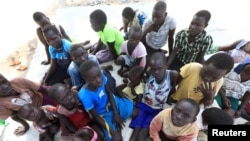Six years after Australian lawyer Kate van Doore set up an orphanage in Nepal she was astounded to find that the children she thought she was helping were not orphans at all.
They were "paper orphans" - children given fake identities after being taken from their families and placed in orphanages to attract funding from foreign donors and tourists.
"It was devastating to discover these children had been exploited for profit. I was horrified and determined to fix it," van Doore said.
She is now calling for an end to orphanages which she says cause irreparable harm to children and fuel trafficking, pushing the Australian and British governments to take a lead on this.
About 80 percent of an estimated 8 million children in orphanages or other institutions are not orphans, according to Lumos, a charity founded by "Harry Potter" author J.K. Rowling,
which aims to have no children living in institutions by 2050.
Traffickers have worked out that orphanages are good business, attracting large donations from individuals, governments, charities and faith groups.
From Cambodia to Haiti, the number of orphanages across the developing world has mushroomed, but they need children in them.
Experts say "child-finders" often prey on poor rural families, promising to provide their children with an education.
"We don't have orphanages because we have orphans. We have orphans because we have orphanages," said van Doore who will speak about orphanage trafficking at the Thomson Reuters Foundation's annual Trust Conference in London on Wednesday.
‘I'm not an orphan’
In 2006, van Doore founded an orphanage in the Nepalese capital Kathmandu with two friends. Four years later their charity, Forget Me Not, took over another orphanage in Uganda.
"The kids started saying to us, 'Can I go home to mum now?'," van Doore said. "The whole lid got blown because these kids stepped forward and said, 'I'm not an orphan.'"
She said the female pastor running the orphanage had given the children fake identities after promising to educate them.
The pastor kept them in a "pitiful condition" to boost funding, van Doore said. Many had malaria and were malnourished.
In Kathmandu, Forget Me Not discovered a similar scenario with the orphanage showing them fraudulent death certificates for the children's parents and the children told to lie.
"There were terrible stories of families coming to the gate and the child watching from the window as they were turned away," said van Doore, an international child rights lawyer and academic at Griffith Law School in Australia.
Forget Me Not has since helped rescue hundreds of children from orphanages in Nepal. It has reunited many with their parents and is caring for others while their families are found.
The U.S. State Department identified orphan trafficking as a form of modern slavery in its 2017 and 2018 Trafficking in Persons Reports.
It says the industry is fueled by demand from tourists to visit or volunteer in orphanages, often for a fee or donation.
Many orphanages are set up in tourist spots. Some make children perform shows, send them out to beg, or force them into labor or sexual exploitation, it said. A lack of screening of volunteers places children at risk of sexual abuse.
The constant rotation of volunteers also creates serious attachment problems, which impact their relationships as adults.
Experts say even well-run orphanages are detrimental to children's psychological, cognitive and physical development.
Forget Me Not and Lumos want to redirect funding from orphanages into family and community-based care for children.
Australia, which is due to introduce a Modern Slavery Act this month, is the first country to recognize orphanage trafficking as a form of modern slavery and will put pressure on travel companies to end orphanage tourism.
Van Doore is also discussing the issue with British officials.
"If people knew the harm they caused by funding, volunteering and visiting orphanages it would have a real impact. We need to get that message out," she said.





